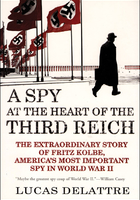As the carriage rattled along the high route, Faith kept her hands tightly balled to hide the mark on her glove. She was sick with self-hate. If her father looked through his letters, he would spot the evidence of her crime instantly. Who else had been alone with the strongbox? He would soon deduce that she must be responsible.
She would be caught. She deserved to be caught. What was wrong with her?
And yet all the while her mind gnawed at the wording of the letter, simmering with outrage on her father's behalf. How could anybody believe that any of his finds were fakes, let alone his famous New Falton fossil?
Everybody had agreed that it was real. Everybody. So many other gentlemen experts had examined it, prodded it, exulted over it, written about it. One journal had named it "The New Falton Nephilim," though her father never called it that, and declared it "the find of the decade." How could they all be wrong?
He must have enemies. Somebody must be trying to destroy Father.
Dusk was settling as they crested the hill, then zigzagged down a rough and winding road. At last the carriage slowed, and Faith made out the yellow glow from an open doorway.
It was an old farmhouse, slate-roofed and built of jagged brown stone that looked like shattered caramel. On the other side of the cobbled courtyard stood a stables and barn. Behind them rose a domed greenhouse, its panes milky in the half-light. Beyond lay a lawn, then the edge of a dark, ragged copse, and a dim outline that might have been another building.
The carriage splashed its way through the puddles and came to a halt. Clay leapt out and handed Faith from the carriage while Uncle Miles settled with the driver.
"Good evening!" The curate gave Faith and Uncle Miles a hasty bow. "I shall not keep you in the rain!"
A manservant ran out and started unloading the luggage. Under the cover of the umbrella, Uncle Miles and Faith ran to the open door. A gaunt, middle-aged woman stood aside to let them enter.
"Mr. Miles Cattistock and Miss Sunderly? I am Jane Vellet—the housekeeper." She had a deep, mannish voice, and small, shrewd, unforgiving eyes. Her dress was striped in shades of dark green and buttoned high at the throat.
The hall was darker than expected, the only light coming from two lanterns perched on sills. There were black timber beams in the ceiling. Faith could taste paraffin on the air, and a host of other smells that told her the house was old, and had settled into its own way of being, and was not her home.
Soon Faith was sitting in front of a blazing hearth next to Uncle Miles and Myrtle, with a bowl of hot soup in her hands. If Myrtle felt any remorse at having left her daughter by the roadside, she hid it well. She was pink and purposeful, and had apparently reconnoitred the family's new abode and found it grievously wanting.
"They have no gas at all," she informed Faith, in a stage whisper. "They say that there is some to be had in the town, but out here we shall be surviving on lamps and dips. There is no cook, only a housekeeper, a housemaid, and a manservant. They all worked for the last tenants—two old invalid ladies—and were kept on. Apparently the housekeeper and maid 'managed' the cooking between them. But how shall they manage for a family of five? And there is no nurse for Howard—you must take care of him, Faith, until we can find someone."
"Where is Father?" asked Faith when her mother paused for breath.
"He went out to find a home for a botanic specimen as soon as he arrived," Myrtle answered wearily. "Apparently the greenhouse will not suffice. Instead he has been out in the Folly for an age, fussing over his plant."
"The Folly?"
"An old tower, apparently." Myrtle cleared her throat as the housekeeper passed through the room. "Mrs. Vellet, what is the Folly?"
"It was intended to be a spotting tower, madam," Mrs. Vellet answered promptly, "looking for Napoleon's ships. They never built forts here on Vane the way they did on Alderney. The gentleman who owned the house back then decided he should build his own defenses, like a good Englishman."
"Was it of any use?" asked Myrtle.
"He ran out of money before it was finished, madam, and then the war ended," answered Mrs. Vellet. "It was used as an apple store for a while … but it leaked."
"Peculiar place to put a plant," mused Myrtle. She sighed. "In any case, nobody is permitted to interrupt him or go anywhere near the Folly. Apparently the plant is frightfully delicate and exotic, and an untrained gaze will cause all its leaves to fall off, or something of the sort."
Faith wondered whether her father had retreated into the forsaken tower because it was the only place he could be alone. Her heart ached. She knew some great animals retreated from their pack when they were wounded.
Faith lost herself in the exhausted fog of her own thoughts and worries, while her mother rattled on. Before long, however, even Myrtle's ever-ready conversation was waning. The long journey had left them all depleted, like paintbrushes drawn across a broad stretch of canvas. Eventually it was noticed that Faith's head was drooping, and she was told to go to bed.
"You have the smallest room, darling," Myrtle told her, "but there was no help for it. You do not mind, do you?"
Mrs. Vellet took up a candle and offered to show her to her room. As they passed through the hall, Faith glanced through a door and saw that a small parlor had been conquered by her father's menagerie. The lizards stared through the glass. The elderly wombat snuffled and twitched in its sleep, which was virtually all it did these days. Faith frowned as she realized that she could not see the snake.
There was a stack of the family's trunks and boxes against one wall of the hall. With disbelief, she recognized the snake crate near the bottom of the stack. It had been abandoned in the cold hall as if it were just a hatbox.
Faith ran over and crouched beside it, pressing her ear against it. She could hear nothing from within.
"Mrs. Vellet—could you please have this box brought up to my room?"
Faith's room turned out to be tiny, less than half the size of her bedroom at home. The vigorous fire in the hearth cast light on a hand washstand with a chipped marble top, an elderly dresser, and a four-poster with curtains that had probably known another monarch. In the shadows beyond the dresser she could just make out another door, with great bolts on it.
"Would you like a posset brought up before you sleep?" asked the housekeeper.
"Do you have any dead mice?" As soon as the words were out of Faith's mouth, she became aware that this was perhaps not the best response. "My father has a Mandarin trinket snake!" she explained hastily, and watched Mrs. Vellet's eyebrows rise another fraction of an inch. "Meat … tiny scraps of fresh meat will do," she stammered, suspecting that she was not making the best first impression. "And some rags. And … a posset would be most agreeable, thank you."
Only when she was alone in the room did she open the crate and lift out the cage within. The trinket snake was a disconsolate figure eight in the bottom, sleek black except for the flares of gold and white. The patterning always made Faith think of a candlelight procession through an ink-black wood. Back at the rectory she had spent a lot of time with her father's little menagerie, and even taken on their care during his absences, but the snake had always been her favorite. He had brought it back from China eight years before.
When Faith reached in and stroked its back, she was relieved to see it flinch a little. It was alive at least. She placed the cage on the dresser, away from the chill draft of the window, but not too close to the fire either. It was a cool-weather snake, and too much heat would kill it as surely as too little.
Mrs. Vellet returned, and handed over a bundle of dry rags and a bowl of beef scraps, before departing once more. Faith pushed the rags into the cage to serve as a nest, and filled the snake's water bowl from the jug by her bed. The snake ignored the meat, but it basked and bathed in the water.
Only when Faith was sure that the snake was not about to slither through death's door did she remember the ink stain on her glove. She tried to wash it out using the cold water in the ewer by her bed, but in vain. In the end she hid the gloves under the mattress.
Faith's clothes were tyrants. She could not step across a dusty road, brave the rain, sit in a wicker chair, or lean against a whitewashed wall without something becoming damaged, gathering dirt, wearing smooth, or losing its stiffening. Her garments were always one misstep away from becoming a source of guilt. Eliza had to spend hours brushing the mud out of your hem …
Worse, they were traitors. If she slipped outside in secret, or hid in a cupboard, or leaned against a dusty door to listen, her clothes would tell tales on her. Even if her family did not notice, the servants would.
Faith retired, but found it hard to sleep. Strands of horsehair poked through the mattress cover and sheet. The bed curtains did not close properly and let in a clammy draft. The long day had printed itself on her brain, and when she closed her eyes she saw gray skies and dark, turbulent waves.
The wind rattled the shutters and bolted door, and sometimes behind its moan she heard a distant, roaring boom, like a sound from an animal throat. She knew that it must be a trick of the wind, but her imagination painted some great black beast out on the headlands, baying amid the storm.
She wondered whether her father was still self-exiled in the Folly. Faith sometimes felt that there was a connection between them, like a hidden root linking a mangrove tree to its little sprouting "children." For a moment she tried to imagine the link, and told herself that perhaps, somehow, he would be able to sense her feelings if she felt them hard enough.
I believe in you, she told him in her head. Whatever anybody else says, I believe in you.
Faith was jolted awake by the pounding of rapid footsteps against wood. She opened her eyes and as she took in the unfamiliar canopy above, her memories flooded back.
She pushed open her bed curtains, half expecting to see somebody running around her room. The footsteps had sounded so close, mere yards from her head. There was nobody there, of course, but as she listened she heard them again, and this time understood the rhythmic creak. It was the sound of somebody running up or down stairs.
The servants' stairs! Her room must be close to them, so close that she could hear them through the wall. Faith rose and stalked around the room, pressing her ear to the walls, and felt a frisson of triumph when she found the place where the sounds were clearest. She could even make out the distant murmur of conversation.
Most people would have been outraged at such a discovery. The whole point of the servants' stairs was that the servants could come and go without the family being forced to notice them. What good were they if they forced themselves on your attention, and woke you at dawn? For Faith, however, it was not an annoyance; it was a chance to listen in on the servants' invisible world.
Although, of course, she would not be using it for that.
The bolts on the mysterious door beyond the dresser were rusty, but she eventually worked them loose. The door stuck and then opened with a judder, and Faith found herself blinking into sunlight.
It was a little roof garden, its pale stone slabs blotchy with dew. Around its perimeter ran a wrought-iron trellis, heavy with creeper, shielding it from the view of those below. White stone children, pocked by lichen and time, held out stone basins from which purple aubretia tumbled. At the far side she could see a little vine-trammeled gate, and beyond it a set of stone steps, presumably leading down to ground level.
Faith felt a smile creeping across her face. If she had been of a sneaking temperament, she would now have her own private means of leaving or entering the house unobserved.
She dressed, and continued her exploration. Walking down the main stairs she reflexively counted the steps, memorizing which ones creaked and which could be trusted to be discreet. Faith caught herself making mental notes of which bolts and latches would need to be secretly oiled.
No! Faith was giving up that.
She was soon to be confirmed, she reminded herself, and felt her usual lurch of fear at the thought. She would be an adult in the eyes of the Church and God. Her sins would be her own. Of course she had always felt immortal judgment swinging above her head, like a vast, deathly pendulum, but her youth had been a frail shield—an excuse. Now she was growing tall enough that the pendulum might strike her down with one mysterious swipe. All her evil habits needed to come to an end.
Nonetheless, murmured a scurrilous voice in Faith's head, the house at Bull Cove was showing some potential.
……
Entering the murky, wood-paneled dining room, Faith found her mother upbraiding the housemaid, a spiky, pretty, dark-haired girl of about fifteen, with an eternal smirk hovering in the corners of her mouth.
"No, Jeanne, it will not do at all!" Myrtle gestured to the board in the housemaid's hands on which lay two outlandishly long loaves of a sort Faith had never seen before. "When I ask for bread and butter, I expect slices cut from a real loaf of bread, so thick." Myrtle held up her forefinger and thumb, half an inch apart. "See to it, if you please."
The maid gave a brief, noncommittal pout, a shrug of the face, and departed with the board.
"What a house!" exclaimed Myrtle. "I could barely sleep a wink last night. I am sure that the rooms had not been aired. And what in the world was that frightful noise that boomed and bellowed all night?"
"Apparently that is the Great Black Bull," Uncle Miles told her with a twinkle. "When the storm is high the beast leaps from the bowels of the earth and bellows at the heavens. Or rather, it is a perfectly natural phenomenon caused by the wind blowing through sea caves."
"Well, I think it is too bad of the landlord to have leased us the place without mentioning the bellowing spectral cattle," Myrtle answered sharply.
"Ah, but according to local superstition, there is barely an inch of this island that does not have its own phantom," Uncle Miles rejoined, smiling. "Clay recounted some of the tales to me yesterday—wailing women, ghost ships, and so forth. Oh, and apparently Vane was a nest of smugglers during the war with the French. They say that one buried a good deal of treasure before he died, and for fifty years his ghost has been trying in vain to lead people to it."
"He cannot be very good at charades," Faith murmured under her breath as she sat down at the table.
"Well, on a more earthly note, it would seem that two cards were left for us this morning." Myrtle glanced at her husband. "One is from Dr. Jacklers, my dear—he says that he hopes to have the pleasure of calling on us at two this afternoon, and taking you to see the excavation.
"The other is from Mr. Lambent saying that the local geology society is meeting at his house at four o'clock, and that they would all be obliged if you would attend as guest of honor. Oh, and the rest of us are invited to afternoon tea. He offers to send his carriage for us."
The Reverend gave his wife a brief, cloudy look, inclined his head to show that he had heard, and then returned to the silent consumption of his breakfast.
"Perhaps we should all go to see the excavation with Dr. Jacklers," suggested Uncle Miles in hopeful tones. "We could make it a family outing."
"Could we?" Faith gave her parents a look of excited appeal. In her father's library at the rectory, she had spent long hours poring over books dedicated to the beasts of prehistory, marveling at the sketched bones of long-extinct creatures. She was thrilled by the thought of seeing a real, live excavation.
Myrtle looked to her husband, who gave the table a distracted look and cleared his throat.
"I do not see why not," he said.
Jeanne returned, set down a board gently with an air of studied innocence, and walked out again. The long loaves had been hacked into half-inch slices with aggressive thoroughness, and had not survived the experience. Tatters of bread lay in a heap of crust-shrapnel, glued into clots by dabs of butter.
"Jeanne!" Myrtle called after the departing and conveniently deaf housemaid. "Jeanne! Oh, this is too much! I shall have to take Mrs. Vellet to task—indeed I shall!"
From above came a muffled thunder, the sound of small, careless feet running, followed by a few experimental door slams. Myrtle winced, and glanced toward her husband, who was frowning at the ceiling with cool disapproval. Howard was not even supposed to be seen at such a time, and definitely not heard.
"Faith," Myrtle said in an undertone, "would you be a dear and take breakfast with your brother today, then help him with his lessons?" She did not even look at Faith for a response.
Faith cast a wistful farewell glance at the kedgeree, bacon, toast, and marmalade, and rose from her seat.
Myrtle had once explained to Faith that there was a right way to give an order to a servant. You phrased it as a question to be polite. Will you fetch the tea? Could you please speak with Cook? But instead of your voice pitch going up at the end, you let it droop downward, to show that it was not really a question, and they were not expected to say no.
It occurred to Faith that that was the way her mother talked to her.
Howard had two adjoining rooms assigned to him, a "night nursery" for sleep and a "day nursery" for his games, lessons, and meals.
"I hate them," he said, sipping his toast-and-water. "They have rats in the dark. I can't sleep without Skordle." "Skordle" was Howard's rushed pronunciation of "Miss Caudle," his nursemaid who usually slept in his room back in Kent. Faith secretly rather liked the name "Skordle" and thought it sounded like a mythical animal.
Faith did not like the nurseries much either, but for different reasons. For the last year she had felt like a seesaw, clumsily rocking between childhood and adulthood. It was always clearest at mealtimes. Sometimes she would find that she had grown into an adult overnight with magical beanstalk speed and was allowed the honor of eating with her parents in the dining room. And then, without warning, she would find herself back in the nursery with Howard, eating porridge while an undersized chair creaked beneath her weight.
Nursery food was "plain" and "wholesome," which usually meant tasteless and boiled to the point of surrender. Day nurseries smelled of it, of potatoes and rice milk and twice-boiled mutton. The smell made Faith feel as though she was wearing an old version of herself that was too small for her. It itched.
"Other hand!" Faith reached out, gently taking Howard's porridge spoon from his left hand and putting it in his right. It was the usual battle.
The hard part came after breakfast when she had to wrestle him into his blue jacket. Howard loathed the jacket, which he had to wear for all his lessons. The left sleeve was stitched to his side, trapping his left hand so that he could not use it.
Howard's willful persistence in using his left hand was, Myrtle insisted, a "fad"—nothing to worry about, providing it was not encouraged. His pre-Skordle nursemaid, however, had been too indulgent, and Howard had developed some "bad habits."
"You know what Mother says! You have to learn to eat and write properly before you go away to school!" The plan was to send Howard off to boarding school once he was eight.
Howard crinkled his face, the way he always did when school was mentioned. Faith swallowed down a little knot of bitterness and envy.
"You are very lucky, How. Some people would be grateful for the chance to go to a good school." Faith did not mention that she was one of them. "Listen! If you wear your jacket and finish your writing exercises, we can explore the garden afterward. You can bring your gun!"
Her bargain was deemed acceptable.
Outside, Howard ran around and "shot" the upper windows of the house, pointing his little wooden gun and uttering shrill cries of "Bang!" He shot the black crows that hopped stolidly away from his hurried approach and then spread lazy, unflustered wings to outpace him. He shot everything down the muddy, scrubby path toward the sea.
If his behavior were noticed, Faith would probably be scolded for letting him "wear himself out." There was always a fear that Howard, the one surviving son, would catch some fatal chill. Faith had already watched five younger brothers lose their grip on life and fold in on themselves like closing daisies. Some had been mere babes, others had eked out a few birthdays. The first two had been Howards, then her parents had tried their hand at a James and two Edwards, with similar poor success. It made the living Howard seem fragile, as if he were holding hands with his namesake brothers through the grim curtain.
However, Faith knew Howard far better than her parents did. She understood that he needed to wheel and race crazily until he tired, just as he needed his toy gun. He "shot" things that frightened him. Right now he was trying to make a whole strange new world feel safe.
Her gaze was drawn to the stubby tower, over by the edge of a copse. By daylight, she could see that the Folly was nothing but a one-storey stump, its chink-windows clogged with mortar and ivy, its stonework tea-stain brown.
It tugged at Faith's curiosity, but she had more pressing worries. Her incriminating gloves were balled up in her pocket. She needed to rid herself of them before they could be found by one of the servants.
The path forked as it approached the sea. The left-hand path climbed up to the cliff-top. Faith and Howard took the right-hand route, which weaved its way down to the pebble beach. There Howard ran amok, shooting nervous-stepping oyster-catchers, the mud-brown cliffs that rose on either side, and his own reflection in the wet sand.
There was a little boathouse on the beach with a rowing boat inside, and behind it a scramble of boulders. As Howard raced over the shingle, Faith slipped behind the boathouse and pushed the gloves into a narrow dark crack between two boulders. At once she felt lighter. Somehow the sting of guilt was always more acute when there was a risk that she might get caught.
Faith returned to the beach. She rather liked it, she decided, for all its dour colors and gray scud of clouds. In her head her father's books of natural history unfurled, and she found the words for what she saw: fleet, sharp-winged terns skimming the gray air. A snub black-and-white razorbill preening its plumage on a crag. Samphire, trembling its white flowers among the rocks.
Staring out at the distant headlands, Faith could see waves plume white as they chafed against the rocks. Here and there she could make out black cracks and triangular fissures at the base of the cliffs.
"Look, How!" she called against the wind, and pointed. "Sea caves!"
Howard ran over and squinted in the direction of her pointing finger, then sighted at the caves down his gun.
"Are there monsters inside?" he asked thoughtfully.
"Maybe."
"Can we go there in the boat and look?"
Faith glanced back at the little rowboat in the boathouse and then peered speculatively at the fraught sea. The dark openings tugged at her curiosity.
"Perhaps another day," she said, half to herself, "but we will have to ask Father and Mother."
When Howard had tired himself out, she led him back up the slope toward the house. Seeing the dun-colored Folly once again, she paused.
The night before, her father had spent hours in the Folly, tending to some mysterious plant. At the time she had thought he just wanted to be alone, but now she found herself remembering the crate of "miscellaneous cuttings" that had robbed her of a seat in the carriage. It was a strangely vague label, come to think of it. Her father was usually so precise.
"Howard, shall we look for lions around the Folly?"
Faith had to circle around the building to the side nearest the trees before she found its heavy wooden door. She could not be seen from the house, and the temptation was too great. She lifted the aged latch and opened the door.
Inside lay darkness. A strange smell reached her nose, with a coldness like mint that stung her eyes.
She looked upward and saw murky rafters, gray with spider-cities. The roof was intact, she realized with surprise, blocking out the daylight. Why would her father put a precious specimen somewhere that the sun could not reach?
Faith took a careful footstep into the Folly, her boot sliding slightly against the slimy dankness of the stone floor. She peered into the shadows of the little, round room.
There was something huddled against the far wall, a domed shape shrouded in an oilskin cloth, the rounded base of a plant pot just visible beneath the fabric. It was two feet high, small enough to have fitted in the crate.
Just as she was edging toward the strange shape, she realized that the cries of "Bang!" behind her were becoming louder and more excitable. In a guilty panic she fled back into the daylight, and quickly fastened the Folly door behind her. She looked around, fearing to see her father returning from some walk.
Instead she saw Howard aiming his gun into the thicket. A strange man was tramping through the bracken.
He was not one of the servants; Faith could see that at a glance. His clothes were worn, his hair uncombed, his beard shaggy. A wooden pail hung from one of his hands. A trespasser, then. His strangeness screamed threat in Faith's head. She felt every hair rise, as if she were an animal smelling another species.
Fourteen years of trained fears broke into full stampede. A strange man. She was a girl, nearly a woman, and of all things, she must never be near a strange man without protectors and witnesses. That way lay a chasm in which a thousand terrible things could happen.
"Bang!" shouted Howard. The man stopped and turned to look at them.
Faith scooped up Howard and broke into a struggling run toward the house. She burst in through the front door and almost collided with her mother, who was just leaving the drawing room.
"Heavens!" Myrtle raised her eyebrows. "Faith—what is the matter?"
Faith put Howard down, and panted an explanation. Myrtle hurried to fuss over Howard, who realized that he must be hurt and promptly broke into a wail.
"Look after Howard, Faith—I will tell your father."
A few moments later, Faith's father strode into the parlor, where Faith was distracting Howard.
"Where was this man?" he demanded.
"Near the Folly," replied Faith.
"How close did he come?" demanded her father. Faith had never seen him so grimly agitated. She felt a little pang of warmth at his concern.
"About ten yards—he was walking past, downhill."
Mrs. Vellet came promptly at the Reverend's call. There was a slight, unhappy flush in the housekeeper's cheeks, and Faith wondered whether Myrtle had been "taking her to task" as promised.
"That sounds like Tom Parris," Mrs. Vellet answered immediately, when she heard Faith's description of the stranger.
"Perhaps you would tell me why this Parris was permitted to trespass on this estate?" The Reverend's voice was steely.
"My apologies, sir," the housekeeper responded swiftly, "but these grounds are the shortest way down to the beach. It is the best beach on the island for cockling, so …" She spread her hands, with an increasingly familiar air of self-absolution. There it is, and there is nothing I can do about it.
"No further trespass is to be permitted," the Reverend announced starkly. "I have the safety of my wife and children to consider, and valuable specimens in the hothouse that I do not intend to leave at the mercy of the larcenous or idly curious. While I am leasing this property, I shall regard all those who trespass on the grounds as poachers. If you know these interlopers, inform them that I shall be investing in rabbit traps."
How close did he come? At first Faith had gratefully taken this as concern for her safety, and that of Howard. As she calmed herself, however, she started to wonder whether her father had meant something else.
How close did he come to the Folly?















